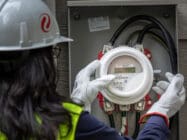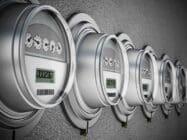
Energy Efficiency Services Limited (EESL), a joint venture of Indian public sector undertakings operating under the country’s Ministry of Power, has announced installation of 3.6 million smart meters across India.
Installation is being coordinated under the JV’s smart meter national programme (SMNP), which is delivering smart meters to the states of Andhra Pradesh, Uttar Pradesh, Haryana, Bihar, NDMC-Delhi and Telangana.
The aim of the SMNP is to improve the billing and collection efficiencies of distribution companies (DISCOMs) operating in the country.
According to EESL, the smart meters are connected through a web-based monitoring system to help reduce commercial losses.
The smart meters are further hoped to enhance revenues and serve as an important tool in the country’s power sector reform.
Power sector reforms
Earlier this year in June, India‘s Ministry of Power announced ₹664 billion ($8 billion) in incentives for power sector reform across the country’s States.
The incentives will be granted in the form of borrowing permissions, aiming to encourage each state to undertake reforms to enhance the efficiency and performance of the power sector.
The financing will be made available via the 2021 to 2022 union budget.
Additionally, states the Power Ministry, ₹1.4 trillion ($17.4 billion) has been earmarked as an incentive to States for undertaking the reforms in the 2023 to 2024 fiscal year.
Have you read:
5 million IoT enabled smart meters for India
INSTINCT 3.0 to drive competitive smart metering applications in India
To be eligible for the incentives, State governments must undertake a set of mandatory reforms and meet stipulated performance benchmarks.
The required reforms include:
• Reducing losses of public sector power distribution companies (DISCOMs) by the State Government
• Transparency in the reporting of financial affairs of the power sector, including payment of subsidies and recording of liabilities of Governments to DISCOMs and of DISCOMs to others
• Timely audits and rendition of financial and energy accounts
• Compliance with legal and regulatory requirements








